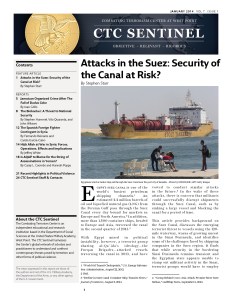Cover Story Overview
Attacks in the Suez: Security of the Canal at Risk?
By Stephen Starr
Egypt’s Suez Canal is one of the world’s busiest petroleum shipping channels. An estimated 2.2 million barrels of oil and liquefied natural gas (LNG) from the Persian Gulf pass through the Suez Canal every day bound for markets in Europe and North America. With Egypt mired in political instability, however, a terrorist group sharing al-Qa`ida’s ideology—the Furqan Brigades—attacked vessels traversing the canal in 2013, and have vowed to conduct similar attacks in the future. There is concern that militants could successfully disrupt shipments through the Suez Canal, such as by sinking a large vessel and blocking the canal for a period of time. This article provides background on the Suez Canal, discusses the emerging terrorist threat to vessels using the 120-mile waterway, warns of growing unrest in the Sinai Peninsula, and identifies some of the challenges faced by shipping companies in the Suez region. It finds that while security in the bordering Sinai Peninsula remains transient and the Egyptian state appears unable to stamp out militant activity in the Sinai, terrorist groups would have to employ new tactics to sink vessels if their goal was to block the canal for any period of time. Yet such tactics are not beyond their reach, and previous incidents of maritime terrorism could serve as their guide.
 Skip to content
Skip to content

